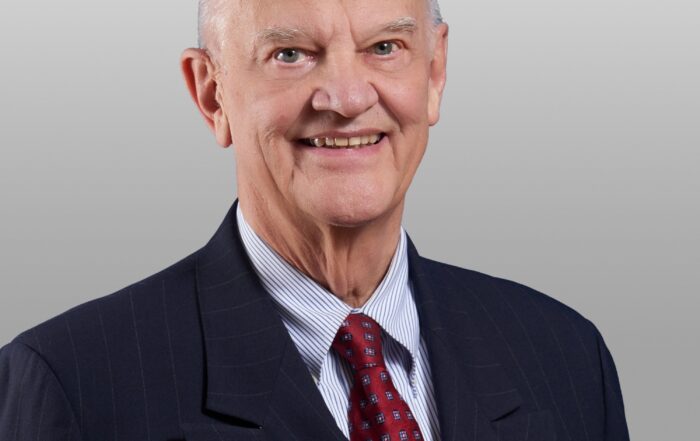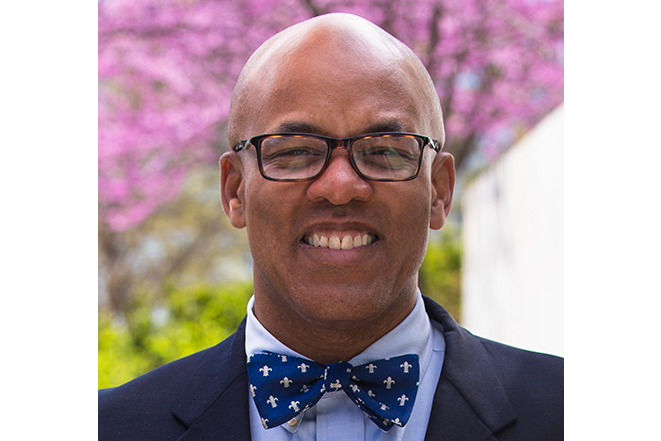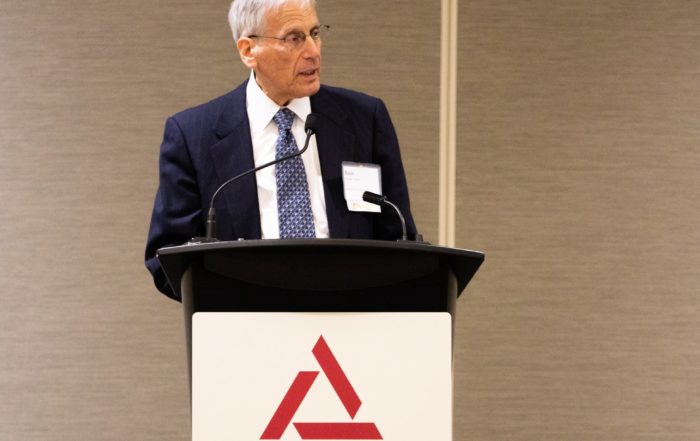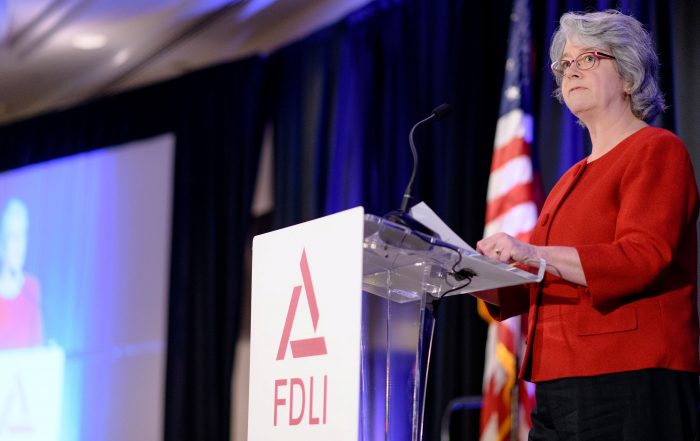9th Annual Eric M. Blumberg Memorial Lecture
December 8, 2022

Good afternoon. I would like to start by thanking the FDLI Board and staff, as well as the Planning Committee for the Enforcement, Litigation, and Compliance Conference. This has always been my favorite FDLI event, even more so than the Annual Meeting, because it delves deeply into the issues that I believe are the most interesting for the FDA-regulated industry, and it brings together so many of my friends.
I am incredibly honored to be giving these remarks today. I reflect on the past lecturers and marvel that I was extended this invitation. They include, just to name a few, Annamarie Kempic, Ann Wion, Rich Cooper, and Liz Dickinson. A dispassionate evaluation of my own professional experience to date leads to the conclusion that it does not rival theirs. But one of the many things that Rick taught his lawyers was to seize opportunities even when—and perhaps especially when—you were not sure you were ready. So here I am, and I could not be more pleased.
For purposes of background for these remarks, I was a litigator working under Rick’s supervision from 2005 to 2011, in the Office of Chief Counsel, or “OCC.” It was my first legal job after my federal appellate clerkship, and I owe a great deal to Rick and the other OCC lawyers who took the time to teach me, even when I was—as I now realize in retrospect—a bit too cocksure. After OCC, I went to Covington & Burling, where I was an associate and then a partner for seven years before leaving to take my current role as the General Counsel of the pharmaceutical company Merck. I have been in this role for nearly five years. But even though I have now spent twice as much time outside of OCC as I spent in it, what I learned there—and much of it from Rick—has left an indelible mark on my career.
The Eric M. Blumberg Memorial Lecture. I still cannot believe that Rick is gone. And I find it even harder to believe that he has been gone for nearly a decade. It is amazing to me how he remains omnipresent in my professional and even my personal life and in the lives of so many of us in the food and drug law bar and the broader FDA community. At the same time, I recognize that many of you—especially some of those bright, fresh faces I see in the audience—likely never met Rick and might not even know much about him. But he is part of our shared lore as a community. He, and the lessons that he taught us, are part of what makes us FDA lawyers and compliance professionals. So, you need to learn your history. And the rest of us would do well to periodically reflect on the lessons that he taught us.
First, the basics. Rick was an institution within OCC and FDA. He was born in Washington, DC, went to high school here, and attended college at Washington & Lee University and law school at Georgetown University. Except for a short stint defending the First Amendment immediately after law school, Rick was a career OCC lawyer. He started in the office in 1970, became the head of litigation in 1991, and held that role for 22 years until his untimely passing in 2013. All told, Rick served more than 40 years in OCC. We were so devastated when he passed away suddenly, in no small part because of the sense of his unfinished legacy. With time, though, I have come to understand that his legacy lives on in each of us whom he taught, mentored, and befriended.
I am honestly a bit tempted to just tell Rick stories for my entire allotted time this afternoon. There are just so many, and they almost always double as a parable of some sort. The problem with that, however, is that many of the really good ones are just too colorful to share in a setting like this one. And these remarks are going to be publicly available after I deliver them. Thinking about my favorite Rick stories though gave me an idea for my remarks today: I have distilled the essence of many of those stories into a few essential truths. I am not quite sure what to call them, so I will just go with Blumberg Axioms.
- We Must Respect Expertise and Honor Public Service
As I mentioned a moment ago, Rick dedicated his career to public service in FDA’s Office of Chief Counsel. No one doubts that he could have joined a law firm or consultancy, or gone in-house at a company, and easily commanded many times his FDA salary. But he never did that. In fact, to my knowledge, and I discussed it with him, he was never tempted to do that.
Rick exemplified a respect for government and for public service that seems to have gone out of vogue. The salary chasm between public and private careers just keeps getting wider, while many citizens malign those people selfless enough to accept those salaries in order to serve the greater good. Of course, there have been criticisms of “bureaucrats” in American politics since at least Woodrow Wilson’s time, but the strain of condemnation we have seen in the last several years is something much more virulent. We now regularly hear that there is a Deep State cabal of bureaucrats who are working to obstruct the will of the voters and pursue their own agenda. Sometimes, such as with recent elections, we have even seen government workers targeted with threats and violence simply for doing their jobs.
This reflects the broader backlash against expertise in our society—a rejection of the supposed elites. We are in the midst of a great populist push. A world in which some argue that everyone’s opinion about anything is as good as anyone else’s. We saw this with COVID vaccination, where people “did their own research” despite having no expertise in virology or epidemiology. This is a fundamental repudiation of both science and rationality. And because so many of our government workers are experts in their particular ambits—they are the policymakers, doctors, scientists, analysts, lawyers, accountants, and regulatory enforcers who create and maintain our country’s infrastructure—a disproportionate amount of the vitriol is directed at those experts. Those who attack them are seemingly oblivious though to the fact that our civil service originated as a bulwark against cronyism and corruption and to ensure we had the institutional memory and deep expertise necessary to run a complex nation. To this day, our administrative system remains a model for the world.
Unfortunately, it is not just a fringe group of conspiracy theorists or even the popular media who have taken aim at our dedicated public servants. It now appears that a majority of the Supreme Court is bent on stripping interpretive and enforcement authority from the agency experts tasked by Congress with administering our laws. In a far-reaching case decided last term, West Virginia v. Environmental Protection Agency, the Supreme Court significantly weakened Chevron[1] deference and resuscitated the long-moribund Nondelegation Doctrine.[2] And the Court has granted cert in two additional cases this term, Axon Enterprise, Inc. v. Federal Trade Commission[3] and Cochran v. Securities and Exchange Commission,[4] that combined may halt agency administrative enforcement proceedings altogether. If the Supreme Court goes that far, it will obliterate the very foundation of our administrative state. And we will all be largely deprived of the specialized knowledge and expertise of the government servants best positioned to interpret and apply our laws to our complex and dynamic world.
Speaking purely in my personal capacity, but as someone with experience being part of an industry regulated by FDA, SEC, FTC, DOJ, and the whole rest of the alphabet, in most situations I would much rather have the detailed rules established and transgressions judged—at least in the first instance—by the agency experts who are immersed in the science, technology, economics, and practical realities that define a company’s particular industry. I want the people who implement the legislation Congress passes to understand the broader statutory and regulatory landscape into which new laws must fit. To appreciate how each provision interacts with all of the others. And to have the historical frame of reference to know what has worked and what has failed in the past. This was one reason why Rick, Ann Wion, and the rest of OCC leadership required all new attorneys in the office to learn the entire Act, and the noteworthy court precedents, even when the counselors were going to specialize in one particular area.
The sine qua non of a company’s interaction with government regulators is predictability, and that is not something we normally receive from Congress. Even where a statute clearly defines what is to be accomplished, the vagaries and tradeoffs inherent in the legislative process necessarily leave undefined and unarticulated many of the details about how that legislation’s aims are to be accomplished. If my years as a registered lobbyist taught me anything, it is that much of our legislation is written by 20-something staffers in the House and sometimes, when it is really important, 30-something staffers on the Senate side. I mean no disrespect to them; they are well-educated and highly committed government servants in their own right, but they generally are not experts. And certainly they are not experts of the depth and experience as are found in the Executive Branch’s regulatory agencies. But now, thanks to the newly revived Nondelegation Doctrine, Congress will need to fill in the operative details of the complex regulatory schemes it enacts.
I realize that it is a little incongruous for me to be the great defender of agency expertise and the value of public service when I have worked longer outside the government than I worked within it, but I have never lost my respect for the competence and professionalism embodied by Rick and so many others in FDA. In fact, when I first left OCC, I intended to come right back. Many of my friends know this, but I went to a law firm intending to stay just long enough to pay off my law school loans, which I thought would take me two years. I even had a paper chain with 24 links in it that I pinned to the bulletin board in my office. Each month, I would snip off a link, write a note about what had been keeping me busy and what I was learning (never anything sensitive or company-specific), staple the paper-chain link to the note, and mail it off to Rick or Annamarie Kempic, who was then OCC’s deputy for litigation. I did this for the first 10 or so months after I left OCC, but over time I came to realize that I really enjoyed practicing law at a firm. And I stopped snipping links off my paper chain.
Back then, I was in the habit of meeting Rick for lunch every couple of months—always at a place that had Guinness on tap—and over one of those lunches, I broke the news to him that I thought I would stay longer at my firm than I had first anticipated. To my relief, Rick didn’t beat me up about it. Quite the opposite. He told me how important it was to have principled advocates on both sides of FDA matters. He understood that one could still be committed to the public health even if we worked for a law firm, consultancy, academia, or even a company.
And Rick was right; in many ways since leaving OCC, I have seen myself simply as the first line of defense in furthering FDA’s mission of “protecting the public health by ensuring the safety, efficacy, and security”[5] of FDA-regulated products. I see myself as intervening and guiding my company, and before that, the clients of my law firm, so that they are always cognizant of and able to adhere to FDA’s legal requirements. I suspect many of you feel the same way. This leads me to my next Blumberg Axiom.
2. Government Should Engage with Industry
Rick loved to rail against FDA-regulated industry, particularly the pharmaceutical industry. Truth be told, he had a jaundiced eye toward many of the companies I later came to represent in private practice and that I found to be both ethical and well-intentioned. Indeed, in order to be successful as a going endeavor, a pharmaceutical company must have at its core a talented and dedicated cadre of physicians and researchers who have devoted their careers to discovering and developing medicines that will improve and even save lives. And they are supported by enabling functions like manufacturing, finance, legal, policy, and marketing, who also see ourselves as the supporting cast in our companies’ missions to save and improve lives.
But Rick came by his distrust of industry honestly, having spent decades bringing enforcement actions against scofflaw companies that did not abide by a public health ethos, sometimes after they had badly hurt or even killed the patients they purported to serve. Rick was therefore never happier than when he was dropping the government’s heavy hammer on some company that he believed had betrayed the sacred trust that people place in purveyors of FDA-regulated products.
At the same time, Rick also intuitively understood that FDA could not fulfill its mandate to protect the public health if it completely forswore any contact with regulated industry except in the rigid confines of enforcement actions, advisory committees, and other official agency fora. As a result, Rick was widely known for being willing to take a call or have a meeting with outside counsel or companies that had business before FDA. He was always careful to include the line attorneys working on the issue, however, for which I was always appreciative and felt improved the quality of the interaction.
As an aside, anyone who attended those meetings could plainly see how much Rick enjoyed them. He was not known for pulling his punches even in the most proper of settings, and his language was colorful in any context. But both of those traits grew even more pronounced in these informal industry interactions. I remember he could be almost gleeful whenever he got to storm out of one of them because the interaction had confirmed his dim view of the company and its behavior. At the same time, he did not go into the meetings with a closed mind or unwilling to hear new information or well-reasoned counterarguments from a regulated company.
My favorite story along those lines was when CDRH came to believe that a company that had manufactured some faulty defibrillators was not doing enough to publicize its recall, as evidenced by the fact that a large percentage of the units had not been returned. The company, for its part, said that it had repeatedly contacted its customers about the recall but that they simply were not returning their units. As a proof point, they took Rick to the hallway outside the conference room at Parklawn and showed him that one of their recalled defibrillators was hanging on the wall. Surely FDA was aware of the recall, and yet, here it hung. Rick shook his head, possibly swore, and then all but acknowledged that FDA no longer had a winnable case. I believe FDA reached a resolution with the company that resulted in a more effective recall but without the threatened enforcement action. In the end, the public health was served, and the taxpayers were spared lengthy litigation that would have gone poorly for the government—all because Rick took the meeting and was willing to listen.
And Rick’s willingness to engage did not end with meetings and phone calls. He made a point of attending FDLI conferences and meetings, including this one, usually dispensing an ominous warning about severe consequences for companies that disregarded FDA rules. He also attended retirement parties for industry lawyers and played in a regular poker game with lawyers from FDA, DOJ, and law firms. He regularly met current and former OCC lawyers for lunch or a happy hour beverage. In short, he was an active member of the food and drug law community to which the people in this room also belong.
So why did Rick make himself and his teams available for these interactions? It certainly was not to curry favor with the bar or regulated industry. His bona fides as a government enforcer with no interest in ever changing sides were well established. I believe it is because, as Liz Dickinson observed in her address a couple of years ago, Rick “was an idealist in that he believed law could be used to accomplish great good for the public health, but he was also pragmatic.”[6] Liz’s words ring true for me. Rick understood that there is, by necessity, a symbiotic relationship between the industry and its regulator. Without those who discover, develop, and market FDA-regulated products, there would not be any need for the agency itself. If government regulators attempt to function in a vacuum or in an ivory tower far removed from regulated industry, they lack the context necessary to fashion workable regulations for the laws they are charged with implementing.
To be frank, I think that Rick did this better than many at FDA who have followed after him. Since my time in OCC, the agency has become more distant and guarded. And we are all poorer for FDA’s absence from public discourse. It is one of the reasons that agency participation in conferences like this one is so important. We should all thank the FDA staff who are here today for their active engagement. I can certainly understand their hesitancy, and the increased vigilance from ethics officials in FDA and HHS, in light of the truly egregious conflicts of interest we witnessed in other parts of the government in the last Administration. But the solution cannot be to seal FDA off from those it regulates. Rather than fundamentally alter how government interacts with those it serves, we should hold those accountable who violated the public trust. And that brings me to my third Blumberg Axiom.
3. We Must Hold People to Account for Their Actions
Rick is perhaps best known for his dogged defense of the Park Doctrine, so named for the 1975 Supreme Court case, United States v. Park, in which the Court held that a corporate officer could be held strictly liable for criminal violations of the Food, Drug, and Cosmetic Act (FDCA) even if she had not engaged in any affirmative wrongdoing.[7] All that must be shown to support her conviction is that as a corporate officer, she had sufficient authority and responsibility to ensure the company’s compliance with the FDCA. In upholding this extraordinary imposition of criminal punishment without a showing that the corporate officer had any personal fault or even knowledge of the violations, the Court found that such extreme accountability was necessary in the unique context of “business enterprises whose services and products affect the health and well-being of the public” because corporate officers in such companies needed to be compelled to not only seek out and remedy violations but also implement policies to prevent those violations in the first place.[8]
Supported by his interpretation of the Park Doctrine, Rick was also notorious for his insistence that consent decrees resolving FDA enforcement actions always had senior-level corporate officers named as individual defendants along with the company itself. As a result, with only one exception, there has never been an FDA injunction and accompanying consent decree that does not adhere to this standard. Such a practice is rare amongst government enforcement agencies. But Rick liked to remind us that violations of FDA laws did not just happen. Companies do not run themselves. Someone made those violations happen. And it should be the responsibility of those same people to ensure that the violations do not recur.
As is clear from his fierce embrace of the Park Doctrine and insistence on the naming of individual defendants in their personal capacities in FDA enforcement actions, Rick championed an extreme form of personal accountability that has few if any analogues in the American legal system. The financial crisis came and went, and the people running the major banks that made the wildly reckless bets were never even charged. Indeed, very few of the banks themselves faced any legal consequences either. And none received fines approaching even a typical disgorgement penalty in a civil FDA enforcement action.
It might be surprising given my years in private practice and regulated industry, but my views have not changed appreciably since I worked for Rick: I think personal accountability has never been more important for corporate executives, of which I am one. I look around, and I see CEOs in other industries behaving badly. At the moment I am thinking of the meltdowns of Twitter and the crypto exchange FTX, but there have been many others in the past few years, and there will no doubt be many more such cautionary tales. But these two examples are of just a social media platform and a marketplace where speculative digital currency is traded. Neither rivals the importance of an FDA-regulated enterprise. Our industry produces some of the most fundamental goods in our lives: the formula we feed our infants, the stent we receive following a serious cardiac event, or the COVID vaccines that billions of us took so that we could more safely resume normal daily life. The manufacturers of these products have undertaken an inviolate commitment to produce them to an extremely high standard, as recognized by the Supreme Court in the Park case.
My view of corporate officer accountability might change if DOJ were to ever bring a true strict-liability Park prosecution at FDA’s behest, but I have yet to see a case in which there was not—at the very least—evidence of knowledge and a failure to act on the part of the corporate officer. As with many statutory authorities, prosecutorial discretion is important. And so is ensuring that we hold people to account for their actions.
I could keep going with at least another ten Blumberg Axioms, but I fear I would exhaust your gracious attention. So instead, I will just leave you with this final observation: it feels as though we are undergoing a changing of the guard within the food and drug law bar. Annamarie retired earlier this year. Ann Wion and Liz Dickinson have also departed in recent years for well-earned respites. And there are numerous private practice attorneys who have retired or are on the cusp of doing so. For those of us who will carry on their important work, it has never been more important to remember the lessons that Rick taught us.
Thank you for having me here today.
[1] Chevron U.S.A. Inc. v. Nat. Res. Def. Council, Inc., 467 U.S. 837 (1984).
[2] 142 S. Ct. 2587 (2022).
[3] 986 F.3d 1173 (9th Cir. 2021).
[4] 20 F.4th 194 (5th Cir. 2021) (en banc).
[5] What We Do: FDA Mission, U.S. Food & Drug Admin., https://www.fda.gov/about-fda/what-we-do (last modified Mar. 28, 2018).
[6] Elizabeth Dickinson, 6th Annual Eric M. Blumberg Memorial Lecture, Food & Drug L. Inst. (Dec. 13, 2018), https://www.fdli.org/2019/02/6th-annual-eric-m-blumberg-memorial-lecture/.
[7] 421 U.S. 658 (1975).
[8] Id. at 671–72.







